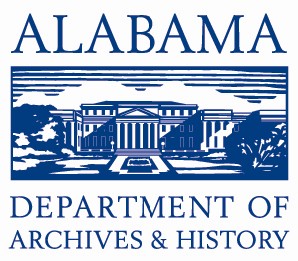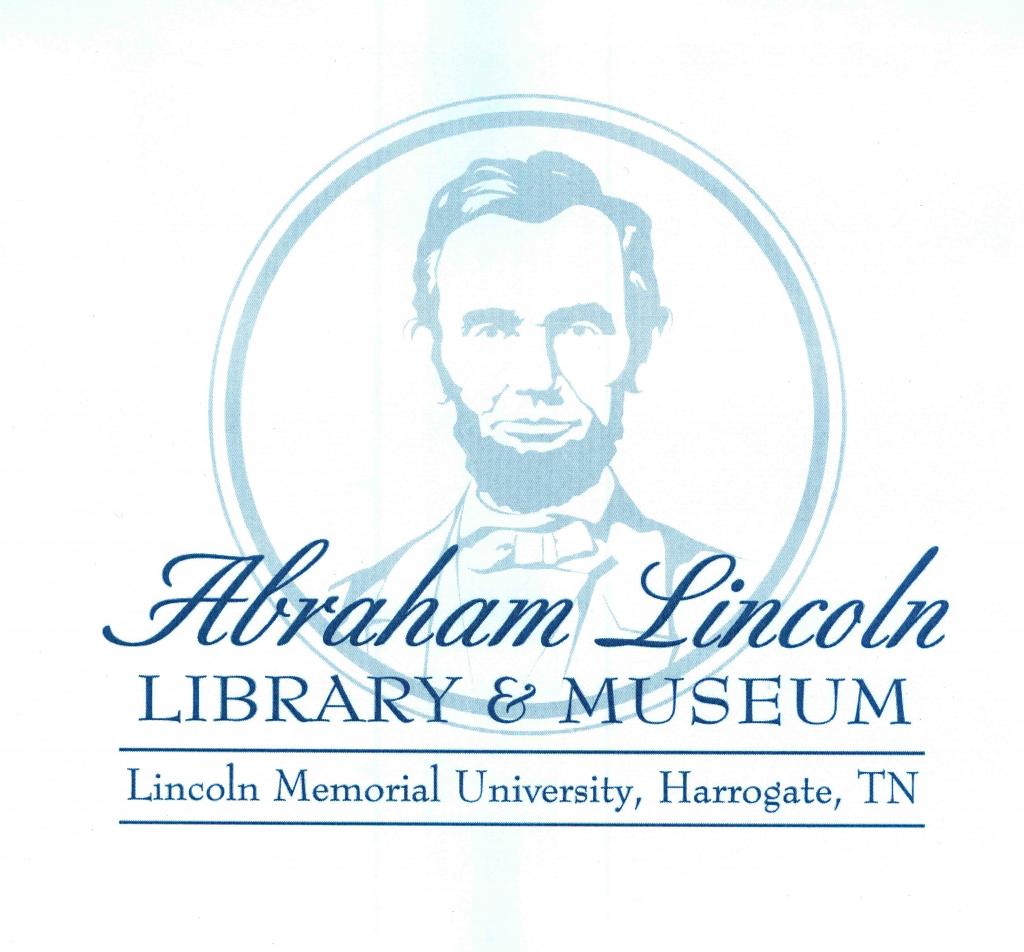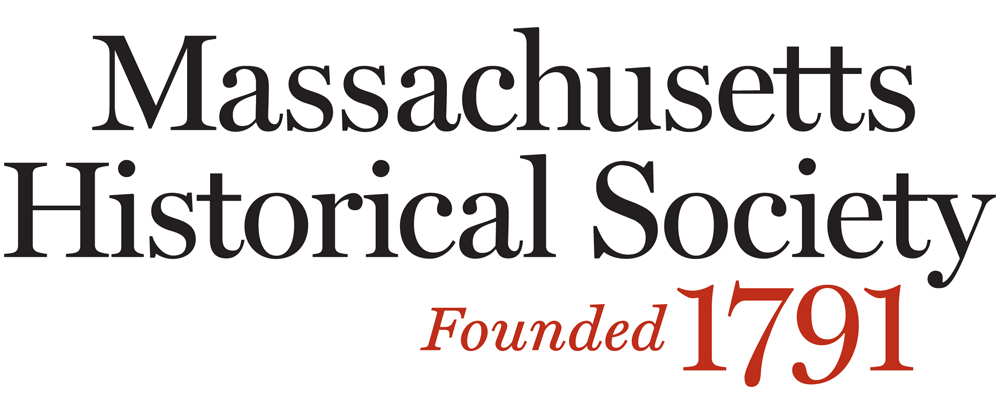from Feb. 16, 1866
Commentary on George Bancroft's memorial address
-
Full Title
Brief news item about the memorial address delivered by George Bancroft on Abraham Lincoln’s birthday in 1866.
-
Description
The address, delivered on February 12, discussed the late president’s plans for the suffrage of African Americans: “…Mr. Lincoln’s wish made only three days before his death, that the elective franchise should only be conferred on very intelligent colored men and those that had served in the U.S. army as soldiers, but that it should be done by the States themselves, and that he never harbored the thought of exacting it from a new government as a condition of its recognition.” Published in the Montgomery Daily Mail on February 16, 1866.
-
Source
Excerpt from the Montgomery Daily Mail, item number ADVCOL42. Catalog record for this title is available here.
-
Rights
Use of this item for research, teaching and private study is permitted with proper citation and attribution, as defined here. Reproduction of this item for publication, broadcast or commercial use requires written permission. For permission, please contact the Alabama Department of Archives and History.
-
Tags
-
Cite this Item
Montgomery Daily Mail. "Brief news item about the memorial address delivered by George Bancroft on Abraham Lincoln’s birthday in 1866.". Remembering Lincoln. Web. Accessed December 15, 2025. https://rememberinglincoln.fords.org/node/232
from Feb. 16, 1866
Brief news item about the memorial address delivered by George Bancroft on Abraham Lincoln’s birthday in 1866.
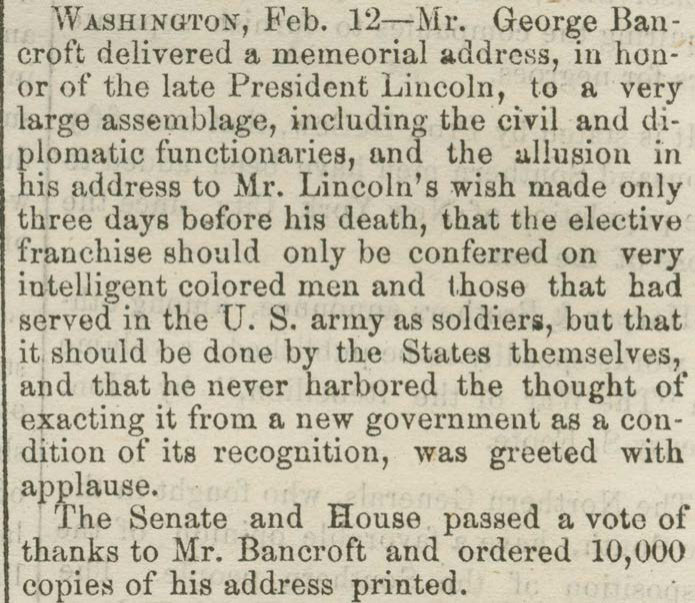
-
Description
The address, delivered on February 12, discussed the late president’s plans for the suffrage of African Americans: “…Mr. Lincoln’s wish made only three days before his death, that the elective franchise should only be conferred on very intelligent colored men and those that had served in the U.S. army as soldiers, but that it should be done by the States themselves, and that he never harbored the thought of exacting it from a new government as a condition of its recognition.” Published in the Montgomery Daily Mail on February 16, 1866.
-
Source
Excerpt from the Montgomery Daily Mail, item number ADVCOL42. Catalog record for this title is available here.
-
Rights
Use of this item for research, teaching and private study is permitted with proper citation and attribution, as defined here. Reproduction of this item for publication, broadcast or commercial use requires written permission. For permission, please contact the Alabama Department of Archives and History.
-
Creator
Montgomery Daily Mail
-
Date
February 16, 1866
from Feb. 16, 1866
"Danger from a Broken Spine!"
-
Full Title
"Danger from a Broken Spine!"
-
Description
This editorial argues for a reinstitution of the writ of habeas corpus by drawing on a colorful statement made by President Lincoln in a message sent to General Joe Hooker: “I wouldn’t take any risk of being entangled up the river, like an ox half jumped over a fence and liable to be torn by dogs, front and rear, without a fair chance to gore one way or kick the other.” The editorial describes the United States as the metaphorical ox, “stuck fast on the reconstruction thorns.” Published in the Montgomery Daily Mail on February 16, 1866.
-
Transcription
Danger from a Broken Spine!
We are apt to gather inspiration from words of wisdom. Congress has just published a volume of nearly a thousand pages from a Committee on the war. In it we find the following striking dispatch from the late lamented Mr. Lincoln to “Fighting Joe” Hooker, just before the latter was hooked by Lee at Chancellorsville:
“I wouldn’t,” writes the President, “take any risk of being entangled up the river, like an ox jumped half over a fence and liable to be torn by dogs, front and rear, without a fair chance to gore one way or kick the other.”
This striking metaphorical language of Mr. Lincoln will live in history alongside of the figure of Corked-up Butler. As it was then applied to Hooker’s army so it may be now applied to the United States. It is like a huge ox, half-jumped over a bois d’arc hedge and stuck fast on the reconstruction thorns. There sticks the old ox, with tongue hanging out and eyes rolling in agony, unable to gore forwards at John Bull or kick backward at Mexico! If the President will only twist its tail a little or build a fire under its nose, by restoring the write of habeas corpus, we think the old ox will get over.
[Transcription by: Dr. Susan Corbesero, Ellis School, Pittsburgh, Pennsylvania]
-
Source
Excerpt from the Montgomery Daily Mail, item number ADVCOL42. Catalog record for this title is available here.
-
Rights
Use of this item for research, teaching and private study is permitted with proper citation and attribution, as defined here. Reproduction of this item for publication, broadcast or commercial use requires written permission. For permission, please contact the Alabama Department of Archives and History.
-
Tags
-
Cite this Item
Montgomery Daily Mail. ""Danger from a Broken Spine!"". Remembering Lincoln. Web. Accessed December 15, 2025. https://rememberinglincoln.fords.org/node/231
from Feb. 16, 1866
"Danger from a Broken Spine!"

-
Description
This editorial argues for a reinstitution of the writ of habeas corpus by drawing on a colorful statement made by President Lincoln in a message sent to General Joe Hooker: “I wouldn’t take any risk of being entangled up the river, like an ox half jumped over a fence and liable to be torn by dogs, front and rear, without a fair chance to gore one way or kick the other.” The editorial describes the United States as the metaphorical ox, “stuck fast on the reconstruction thorns.” Published in the Montgomery Daily Mail on February 16, 1866.
-
Source
Excerpt from the Montgomery Daily Mail, item number ADVCOL42. Catalog record for this title is available here.
-
Rights
Use of this item for research, teaching and private study is permitted with proper citation and attribution, as defined here. Reproduction of this item for publication, broadcast or commercial use requires written permission. For permission, please contact the Alabama Department of Archives and History.
-
Creator
Montgomery Daily Mail
-
Date
February 16, 1866
from Apr. 14, 1866
"Signifcant [sic] Letter."
-
Full Title
"Signifcant [sic] Letter."
-
Description
Excerpt of a letter from Ward Hill Lamon, former U.S. Marshal, to President Johnson. In it Lamon, a close friend of Abraham Lincoln, explains the late president’s plans for restoring the Union after the war: “I was made entirely certain by his own repeated declarations to me, that he would exert all his authority, power and influence to bring about an immediate reconciliation between the two sections of the country…All the energies of his nature were given to a vigorous prosecution of the war while the rebellion lasted, but he equally determined upon a vigorous prosecution of peace as soon as the armed hostility should end.” Published in The Selma Morning Times on April 14, 1866.
-
Source
Excerpt from the The Selma Morning Times, item number 24.0046. Catalog record for this title is available here.
-
Rights
Use of this item for research, teaching and private study is permitted with proper citation and attribution, as defined here. Reproduction of this item for publication, broadcast or commercial use requires written permission. For permission, please contact the Alabama Department of Archives and History.
-
Tags
-
Cite this Item
The Selma Morning Times. ""Signifcant [sic] Letter."". Remembering Lincoln. Web. Accessed December 15, 2025. https://rememberinglincoln.fords.org/node/230
from Apr. 14, 1866
"Signifcant [sic] Letter."

-
Description
Excerpt of a letter from Ward Hill Lamon, former U.S. Marshal, to President Johnson. In it Lamon, a close friend of Abraham Lincoln, explains the late president’s plans for restoring the Union after the war: “I was made entirely certain by his own repeated declarations to me, that he would exert all his authority, power and influence to bring about an immediate reconciliation between the two sections of the country…All the energies of his nature were given to a vigorous prosecution of the war while the rebellion lasted, but he equally determined upon a vigorous prosecution of peace as soon as the armed hostility should end.” Published in The Selma Morning Times on April 14, 1866.
-
Source
Excerpt from the The Selma Morning Times, item number 24.0046. Catalog record for this title is available here.
-
Rights
Use of this item for research, teaching and private study is permitted with proper citation and attribution, as defined here. Reproduction of this item for publication, broadcast or commercial use requires written permission. For permission, please contact the Alabama Department of Archives and History.
-
Creator
The Selma Morning Times
-
Date
April 14, 1866
from Apr. 15, 1866
"The Murder of President Lincoln."
-
Full Title
"The Murder of President Lincoln."
-
Description
Report published a year after the assassination of Abraham Lincoln, suggesting that John Wilkes Booth was not the real murderer of the president. It also speculates that Booth was not killed in Virginia but rather fled the country after the event. The piece, printed in The Selma Morning Times on April 15, 1866, was originally submitted by a Washington correspondent of the New Orleans Picayune.
-
Source
Excerpt from the The Selma Morning Times, item number 24.0046. Catalog record for this title is available here.
-
Rights
Use of this item for research, teaching and private study is permitted with proper citation and attribution, as defined here. Reproduction of this item for publication, broadcast or commercial use requires written permission. For permission, please contact the Alabama Department of Archives and History.
-
Tags
-
Cite this Item
The Selma Morning Times. ""The Murder of President Lincoln."". Remembering Lincoln. Web. Accessed December 15, 2025. https://rememberinglincoln.fords.org/node/229
from Apr. 15, 1866
"The Murder of President Lincoln."

-
Description
Report published a year after the assassination of Abraham Lincoln, suggesting that John Wilkes Booth was not the real murderer of the president. It also speculates that Booth was not killed in Virginia but rather fled the country after the event. The piece, printed in The Selma Morning Times on April 15, 1866, was originally submitted by a Washington correspondent of the New Orleans Picayune.
-
Source
Excerpt from the The Selma Morning Times, item number 24.0046. Catalog record for this title is available here.
-
Rights
Use of this item for research, teaching and private study is permitted with proper citation and attribution, as defined here. Reproduction of this item for publication, broadcast or commercial use requires written permission. For permission, please contact the Alabama Department of Archives and History.
-
Creator
The Selma Morning Times
-
Date
April 15, 1866
from May. 1, 1865
Children's Block Set
-
Full Title
Parlor Monuments, to the Illustrious Dead
-
Description
This child's block set was most likely produced in August 1865 and was manufactured by the firm of Oakley and Mason of New York. The storage box is made of wood, is painted green, and has a sliding cover decorated with a lithograph image of Justice above a pair of oval portraits of Lincoln and George Washington. The set contains 24 wooden blocks decorated with patriotic images and words. The blocks can be assembled into three different "monuments" using an accompanying guide-sheet: the Children's Monument to Abraham Lincoln, the Freedman's Monument to Abraham Lincoln, and the National Monument to Abraham Lincoln. Each block is 2.25 inches high, 1 inch wide, and 1 inch deep. Only two sets are known to exist anywhere, and it is likely that only a small number were made. Copyright searches in New York for the period 1865-1880 have not revealed any information on this item.
-
Source
-
Rights
Use of this item for research, teaching and private study is permitted with proper citation and attribution, as defined here. Reproduction of this item for publication, broadcast or commercial use requires written permission. For permission, please contact the Abraham Lincoln Library and Museum of Lincoln Memorial University, Harrogate, TN.
-
Tags
-
Cite this Item
Manufactured by the firm of Oakley and Mason of New York. "Parlor Monuments, to the Illustrious Dead". Remembering Lincoln. Web. Accessed December 15, 2025. https://rememberinglincoln.fords.org/node/228
from May. 1, 1865
Parlor Monuments, to the Illustrious Dead
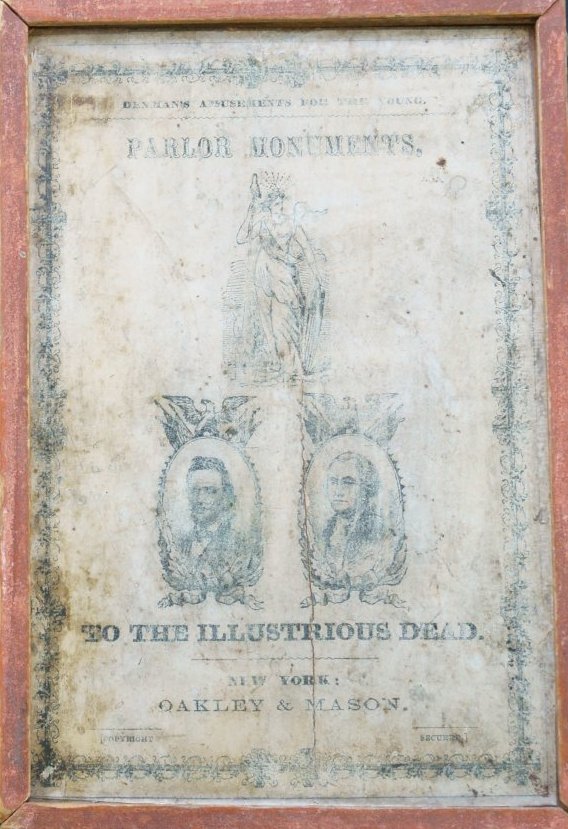
-
Description
This child's block set was most likely produced in August 1865 and was manufactured by the firm of Oakley and Mason of New York. The storage box is made of wood, is painted green, and has a sliding cover decorated with a lithograph image of Justice above a pair of oval portraits of Lincoln and George Washington. The set contains 24 wooden blocks decorated with patriotic images and words. The blocks can be assembled into three different "monuments" using an accompanying guide-sheet: the Children's Monument to Abraham Lincoln, the Freedman's Monument to Abraham Lincoln, and the National Monument to Abraham Lincoln. Each block is 2.25 inches high, 1 inch wide, and 1 inch deep. Only two sets are known to exist anywhere, and it is likely that only a small number were made. Copyright searches in New York for the period 1865-1880 have not revealed any information on this item.
-
Source
-
Rights
Use of this item for research, teaching and private study is permitted with proper citation and attribution, as defined here. Reproduction of this item for publication, broadcast or commercial use requires written permission. For permission, please contact the Abraham Lincoln Library and Museum of Lincoln Memorial University, Harrogate, TN.
-
Creator
Manufactured by the firm of Oakley and Mason of New York
-
Date
May 1, 1865
from Apr. 15, 1865
Gardiner, Maine, Broadside
-
Full Title
Mayor's Office, April 15th, 1865 Whereas, We are informed of the death of Abraham Lincoln.
-
Description
This broadside distributed by the Mayor of Gardiner, Maine, (N. O. Mitchell) focuses on the death of President Lincoln. The broadside asks citizens of the town to gather at their places of worship on April 16, 1865, and pray to God, "imploring his Divine assistance at this time of our great country's peril."
-
Source
Bdses 1865 Apr. 15; Massachusetts Historical Society
-
Rights
Use of this item for research, teaching, and private study is permitted with proper citation and attribution, as: From the Collection of the Massachusetts Historical Society. Reproduction of this item for publication, broadcast, or commercial use requires written permission. For permission, please see this web page.
-
Tags
-
Cite this Item
Gardiner (Me.). Mayor.. "Mayor's Office, April 15th, 1865 Whereas, We are informed of the death of Abraham Lincoln.". [Gardiner, ME.: s.n., 1865]. Remembering Lincoln. Web. Accessed December 15, 2025. https://rememberinglincoln.fords.org/node/227
from Apr. 15, 1865
Mayor's Office, April 15th, 1865 Whereas, We are informed of the death of Abraham Lincoln.

-
Description
This broadside distributed by the Mayor of Gardiner, Maine, (N. O. Mitchell) focuses on the death of President Lincoln. The broadside asks citizens of the town to gather at their places of worship on April 16, 1865, and pray to God, "imploring his Divine assistance at this time of our great country's peril."
-
Source
Bdses 1865 Apr. 15; Massachusetts Historical Society
-
Rights
Use of this item for research, teaching, and private study is permitted with proper citation and attribution, as: From the Collection of the Massachusetts Historical Society. Reproduction of this item for publication, broadcast, or commercial use requires written permission. For permission, please see this web page.
-
Creator
Gardiner (Me.). Mayor.
-
Publisher
[Gardiner, ME.: s.n., 1865]
-
Date
April 15, 1865
from Apr. 29, 1865
"The Sad Rites of Yesterday"
-
Full Title
The Sad Rites of Yesterday
-
Description
The Cleveland Morning Leader newspaper issued this editorial in its April 29, 1865 edition, the day after Lincoln's funeral train had stopped in the city and the body of the slain President was on display for the citizens of the city and surrounding towns to view the President and pay their respect. The editorial paints a clear picture of the mood of the citizenry of one of the Northern states after losing the man who guided the nation through the trauma of the Civil War. Lincoln had won the Presidency with the strong support of Cleveland and the State of Ohio both in 1860 and again in 1864. Cleveland was the largest city in the old Western Reserve area of Ohio, with strong abolitionist feelings dating back to the ordinances of the old Northwest Territory that prohibited slavery. The new Republican Party was especially strong in Cleveland.
-
Transcription
The Sad Rites of Yesterday
Friday, Feb. 15th, 1861, the newly elected President, Abraham Lincoln, passed through Cleveland, on his way from his modest home in Springfield, Illinois, to assume control of the national government. Friday, April 28th, 1865, his dead body is brought back to us, over the same route which he traversed in his former journey, followed by mourners to the home which he left four years ago. What a chasm lies between two days! What volumes of history are embraced in the years which seperate them! What convulsions, what changes, what growth, what enlightenment have they wrought in the heart of the nation! A most striking illustration is found in the contrast which exists between this funeral procession and the triumphal progress. When Abraham Lincoln first visited Cleveland he was personally a stranger to us. We had known him only briefly and imperfectly, and though the sanctity of the great office to which he had been elected invested him with dignity and interest, he was still looked upon as a party candidate, place in the Presidential chair by a singular succession of chances, and possessing no remarkable ability or attainments. Now his murdered corpse comes back to us, followed by a nation of mourners, and city after city, along the line of the grand funeral procession, join, with a unanimity as remarkable as it is unprecedented, in demonstrations of affection and grief for the dead. After four years of toil and suffering and sacrifice in the cause of the nation, he had earned so fully the confidence and esteem of the entire people that they mourn for him with one accord as for a father murdered. He has fallen in the summit and culmination of his glory. But one thing was wanting to make his memory something hallowed and immortal. That was martyrdom, and the bullet of the assassin has rounded and perfected his career, while apparently leaving it incomplete and blank.
The grand funeral pageant, of whose progress through the East we have read with a sad interest, has passed through Cleveland. In another column we give a full description of the ceremonies of the day. We merely desire in this place to call attention to the general - the universal-display of sympathy with the character of the day. The whole city, aye and the whole people of Northern Ohio, united in this our last and most palpable demonstration of mourning. This fact was legible everywhere, not more in crape-shrouded blocks, the draped and decorated catafalque, and the imposing procession, than in the quiet sadness and solemnity of every face, the good-order and decorum everywhere prevalent, and the unanimous suspension of other pursuits to join more fully in the general mourning. The day will live to the end of life in the memory of the people who witnessed it, and fifty years from now the children of today will tell their grandchildren how they looked upon the dead face of the Good President, and how they saw him borne upon his funeral way amid the tears of sorrowing millions, while the world looked on in reverent awe!
-
Source
www.wrhs.org
-
Rights
Permission for personal or research use; publication or reproduction requires written permission from the Western Reserve Historical Society.
-
Tags
-
Cite this Item
Cleveland Morning Leader. "The Sad Rites of Yesterday". Cleveland Morning Leader. Remembering Lincoln. Web. Accessed December 15, 2025. https://rememberinglincoln.fords.org/node/226
-
Creator
Cleveland Morning Leader
-
Publisher
Cleveland Morning Leader
-
Date
April 29, 1865
from Apr. 29, 1865
The Sad Rites of Yesterday

-
Description
The Cleveland Morning Leader newspaper issued this editorial in its April 29, 1865 edition, the day after Lincoln's funeral train had stopped in the city and the body of the slain President was on display for the citizens of the city and surrounding towns to view the President and pay their respect. The editorial paints a clear picture of the mood of the citizenry of one of the Northern states after losing the man who guided the nation through the trauma of the Civil War. Lincoln had won the Presidency with the strong support of Cleveland and the State of Ohio both in 1860 and again in 1864. Cleveland was the largest city in the old Western Reserve area of Ohio, with strong abolitionist feelings dating back to the ordinances of the old Northwest Territory that prohibited slavery. The new Republican Party was especially strong in Cleveland.
-
Source
www.wrhs.org
-
Rights
Permission for personal or research use; publication or reproduction requires written permission from the Western Reserve Historical Society.
-
Creator
Cleveland Morning Leader
-
Publisher
Cleveland Morning Leader
-
Date
April 29, 1865
from Apr. 28, 1865
"The Face of the Dead"
-
Full Title
The Face of the Dead
-
Description
Lincoln was the first President of the United States to be embalmed. His funeral and viewing was done with an open casket, so that in Washington, D.C., and at other stops along the route of the funeral train, citizens could view his body. the funeral train stopped in Cleveland, Ohio on April 28, two weeks after the assassination, where for the first time the casket and catafalque were displayed outdoors. Over 60,000 citizens were reported to have viewed the body during that single day. The next day the Cleveland Morning Leader newspaper reported on the funeral events, including this short article about the countenance of the face of the President. While there are many photographs of the catafalque on display in Cleveland's Public Square, no photographs of Lincoln's body were allowed, so that this direct report provides what we know of how he looked two weeks after his death.
-
Source
www.wrhs.org
-
Rights
Permission for personal or research use; publication or reproduction requires written permission of the Western Reserve Historical Society.
-
Tags
-
Cite this Item
Cleveland Morning Leader newspaper. "The Face of the Dead". Remembering Lincoln. Web. Accessed December 15, 2025. https://rememberinglincoln.fords.org/node/225
-
Creator
Cleveland Morning Leader newspaper
-
Date
April 28, 1865
from Apr. 28, 1865
The Face of the Dead
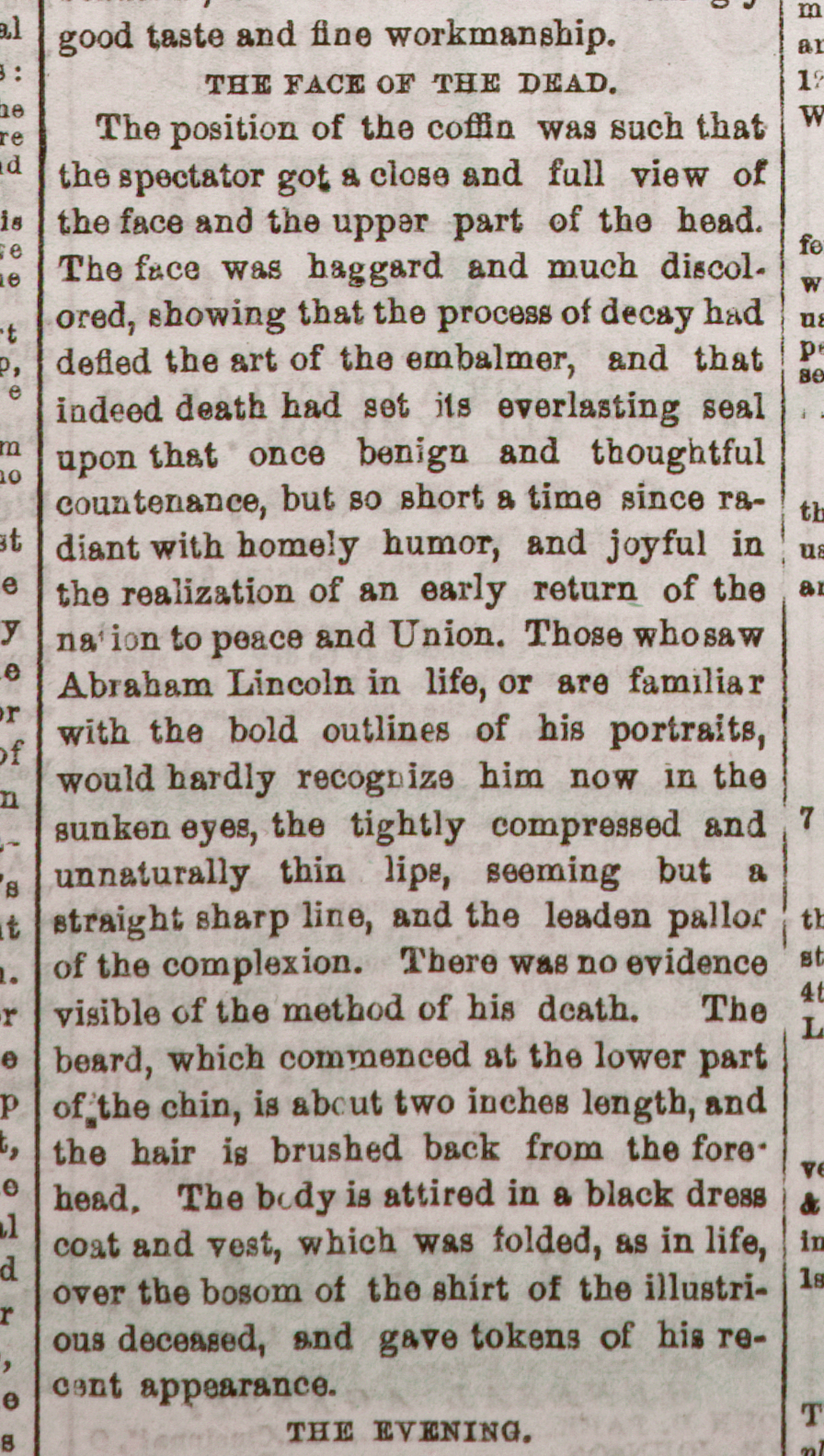
-
Description
Lincoln was the first President of the United States to be embalmed. His funeral and viewing was done with an open casket, so that in Washington, D.C., and at other stops along the route of the funeral train, citizens could view his body. the funeral train stopped in Cleveland, Ohio on April 28, two weeks after the assassination, where for the first time the casket and catafalque were displayed outdoors. Over 60,000 citizens were reported to have viewed the body during that single day. The next day the Cleveland Morning Leader newspaper reported on the funeral events, including this short article about the countenance of the face of the President. While there are many photographs of the catafalque on display in Cleveland's Public Square, no photographs of Lincoln's body were allowed, so that this direct report provides what we know of how he looked two weeks after his death.
-
Source
www.wrhs.org
-
Rights
Permission for personal or research use; publication or reproduction requires written permission of the Western Reserve Historical Society.
-
Creator
Cleveland Morning Leader newspaper
-
Date
April 28, 1865
from Apr. 15, 1865
Cornerstone of Third Cuyahoga County Courthouse
-
Full Title
Cornerstone of Third County Courthouse, Cuyahoga County, Cleveland, Ohio
-
Description
On April 15, 1865 citizens of Cleveland, Ohio, gathered on Public Square to mourn the death of Lincoln by assassination. The architect for the nearby Cuyahoga County Courthouse, J. J. Husband, was heard to say that Lincoln's death was "no great loss." The crowd turned on him, chasing him back to his office, also nearby, and he later that day fled Cleveland for good. Several members of the crowd went to the courthouse, then on the NW corner of Public Square, and chiseled out his name, vowing that his name would never be spoken or read in Cleveland ever after. See "Traitors at Home," a news article appearing the following Monday in the Cleveland Morning Leader, also uploaded to this Remembering Lincoln archive. Shown here is the cornerstone as it appeared in 1930s, when the building was demolished.
-
Source
-
Rights
Permission for personal or research use; publication or reproduction requires written permission from the Western Reserve Historical Society.
-
Tags
-
Cite this Item
Western Reserve Historical Society. "Cornerstone of Third County Courthouse, Cuyahoga County, Cleveland, Ohio". Remembering Lincoln. Web. Accessed December 15, 2025. https://rememberinglincoln.fords.org/node/224
-
Creator
Western Reserve Historical Society
-
Date
April 15, 1865
from Apr. 15, 1865
Cornerstone of Third County Courthouse, Cuyahoga County, Cleveland, Ohio
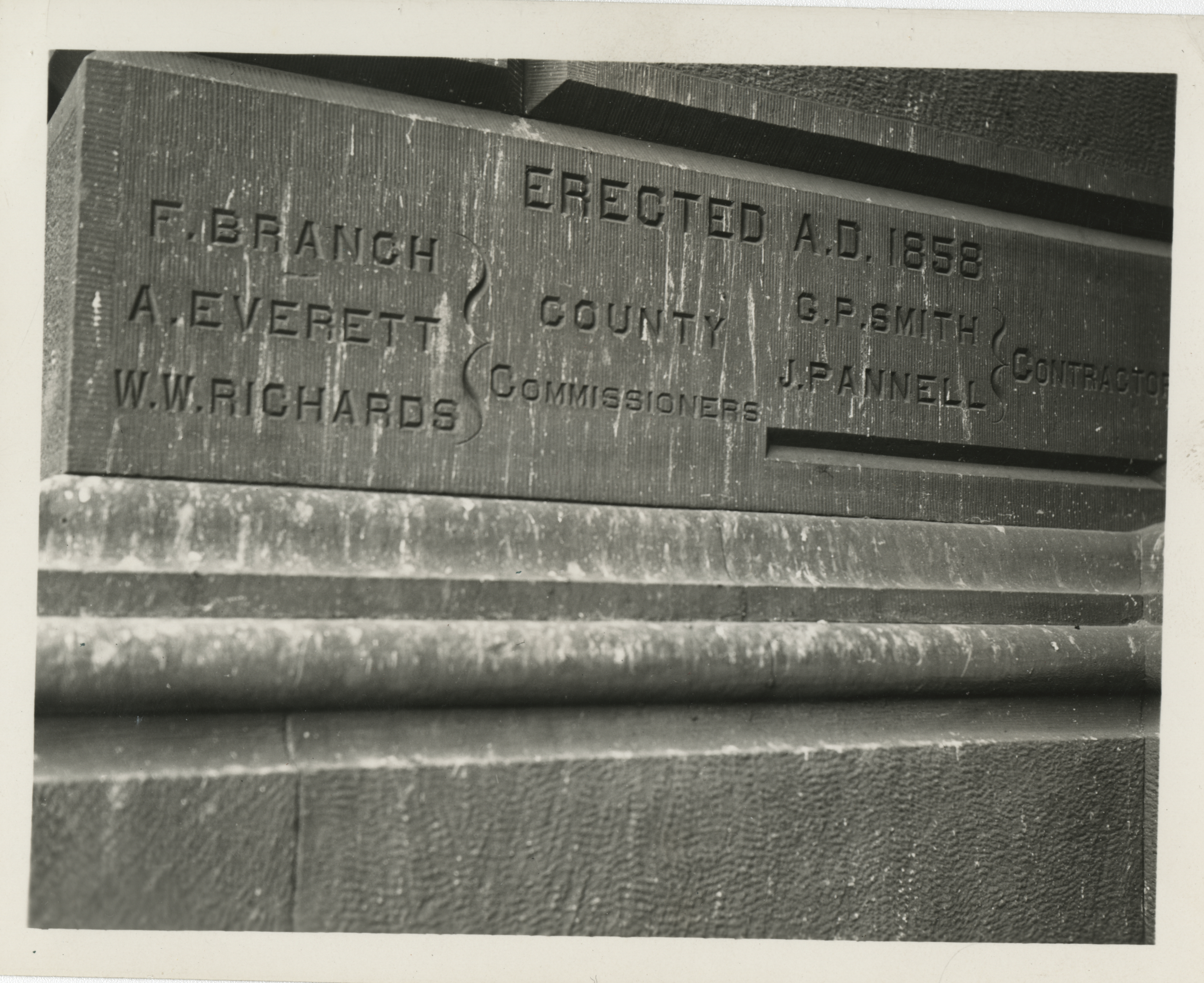
-
Description
On April 15, 1865 citizens of Cleveland, Ohio, gathered on Public Square to mourn the death of Lincoln by assassination. The architect for the nearby Cuyahoga County Courthouse, J. J. Husband, was heard to say that Lincoln's death was "no great loss." The crowd turned on him, chasing him back to his office, also nearby, and he later that day fled Cleveland for good. Several members of the crowd went to the courthouse, then on the NW corner of Public Square, and chiseled out his name, vowing that his name would never be spoken or read in Cleveland ever after. See "Traitors at Home," a news article appearing the following Monday in the Cleveland Morning Leader, also uploaded to this Remembering Lincoln archive. Shown here is the cornerstone as it appeared in 1930s, when the building was demolished.
-
Source
-
Rights
Permission for personal or research use; publication or reproduction requires written permission from the Western Reserve Historical Society.
-
Creator
Western Reserve Historical Society
-
Date
April 15, 1865
from Apr. 17, 1865
"Traitors at Home"
-
Full Title
Traitors at Home
-
Description
Article on page 2 of the Monday April 17, 1865 edition of the Cleveland Morning Leader newspaper describing an incident that occurred the previous Saturday afternoon when citizens gathered on Public Square at 3PM to publicly mourn the death of the President by an assassin. J.J. Husband, the architect of the county courthouse on the NW corner of Public Square at that time and likely a Democrat, was heard to say that Lincoln's death was "no great loss." The crown turned on him and ran him out town. A group then chiseled his name off the cornerstone of the courthouse, vowing that his name would never be heard or read again in the city. The article provides details of this infamous event in Cleveland history.
-
Transcription
Cleveland Morning Leader
Monday April 17, 1867 p.2
TRAITORS AT HOME
___
Eulogists of Murder in Cleveland – How
they were treated.
___
It seems providentially provided for that some villains are fools—so great fools that they parade their villainy before the world. Such was the case of certain traitors in Cleveland Saturday, who were crazy enough to express their joy at the murder of the President, and received therefore some very rough treatment, no more, however, than their just deserts.
The case of J. J. Husband, the well-known architect, who occupies an office and rooms over Fogg’s store, was most prominent. He was in high glee over the news, remarking to one man: “You have had your day of rejoicing, now I have mine;” to another: “This is a good day for me,” and to a third that “Lincoln’s death was a d____d small loss.” It seems that afterward he became sensible of the danger he had incurred by these remarks, for he came sneaking to the newspaper offices to deny that he had made them. We have, however, the authority of half a dozen reliable gentleman, who heard his remarks, against his unsupported assertion.
On his way back to his office he was assaulted by the crowd, but escaped from them. His words were repeated from mouth to mouth, and the indignation of the multitude knew no bounds. The crowd searched the building for him, at last finding him on the roof of the building. He was caught, thrown through the skylight into his room, and knocked and kicked down stairs. The mob then set upon him and would perhaps have pounded him to death had he not been rescued by prominent citizens. He was taken to the courthouse and locked up in a room for safekeeping. He broke out and sneaked off during the day, and, we understand, has since left town. He can never show his face again in Cleveland. His name has already been chipped from the place on the court-house where it was cut as architect.
Another man, named James Griffith, from Hamilton, Butler county, in this State, arrived in town Saturday morning, and on hearing of the news, said to a barber who was shaving him in the Weddell House barber shop, that “Lincoln was a d__d son of a b___h, and ought to have been shot long ago.” Hearing of this the mob started after him. He was taken charge of by Clark Warren and others who carried him to the jail. On the way there, however, the mob got at him and pounded him badly. He is now in jail and ought to stay there for a term of months.
Another traitor, expressing his joy on Ontario street, Saturday morning, was knocked stiff by a little fellow half his size. Other men of Southern sympathies knew enough to keep closely at home Saturday. Cleveland is an unhealthy place for rebels.
[Transcription by Deborah Taylor.] -
Source
www.wrhs.org
-
Rights
Permission for personal and research use; publication and reproduction requires permission from the Western Reserve Historical Society.
-
Tags
-
Cite this Item
Cleveland Morning Leader. "Traitors at Home". Cleveland Morning Leader. Remembering Lincoln. Web. Accessed December 15, 2025. https://rememberinglincoln.fords.org/node/223
-
Creator
Cleveland Morning Leader
-
Publisher
Cleveland Morning Leader
-
Date
April 17, 1865
from Apr. 17, 1865
Traitors at Home

-
Description
Article on page 2 of the Monday April 17, 1865 edition of the Cleveland Morning Leader newspaper describing an incident that occurred the previous Saturday afternoon when citizens gathered on Public Square at 3PM to publicly mourn the death of the President by an assassin. J.J. Husband, the architect of the county courthouse on the NW corner of Public Square at that time and likely a Democrat, was heard to say that Lincoln's death was "no great loss." The crown turned on him and ran him out town. A group then chiseled his name off the cornerstone of the courthouse, vowing that his name would never be heard or read again in the city. The article provides details of this infamous event in Cleveland history.
-
Source
www.wrhs.org
-
Rights
Permission for personal and research use; publication and reproduction requires permission from the Western Reserve Historical Society.
-
Creator
Cleveland Morning Leader
-
Publisher
Cleveland Morning Leader
-
Date
April 17, 1865
